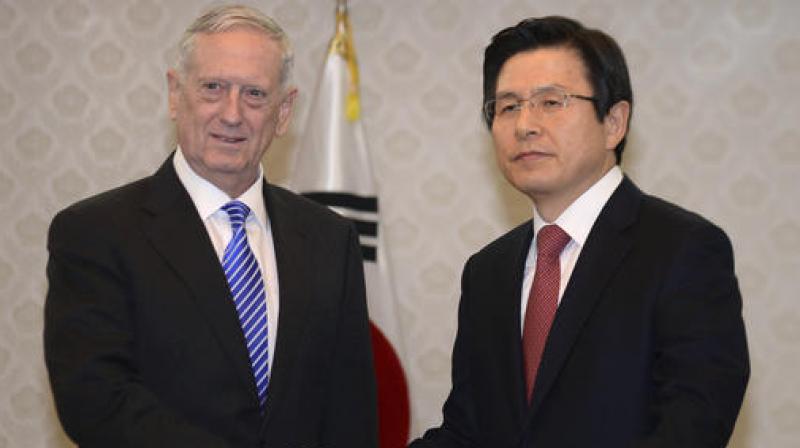US warns North Korea of 'overwhelming' response if nuclear arms used

Seoul: US President Donald Trump's defence secretary warned North Korea on Friday of an "effective and overwhelming" response if it chose to use nuclear weapons, as he reassured South Korea of steadfast U.S. support.
"Any attack on the United States, or our allies, will be defeated, and any use of nuclear weapons would be met with a response that would be effective and overwhelming," Defence Secretary Jim Mattis said at South Korea's defense ministry, at the end of a two-day visit.
Mattis' remarks come amid concern that North Korea could be readying to test a new ballistic missile, in what could be an early challenge for Trump's administration.
North Korea, which regularly threatens to destroy South Korea and its main ally, the United States, conducted more than 20 missile tests last year, as well as two nuclear tests, in defiance of U.N. resolutions and sanctions.
The North also appears to have also restarted operation of a reactor at its main Yongbyon nuclear facility that produces plutonium that can be used for its nuclear weapons program, according to the U.S. think-tank 38 North.
"North Korea continues to launch missiles, develop its nuclear weapons program and engage in threatening rhetoric and behavior," Mattis said.
North Korea's actions have prompted the United States and South Korea to respond by bolstering defences, including the expected deployment of a U.S. missile defence system, known as Terminal High Altitude Area Defence (THAAD), in South Korea later this year.
The two sides reconfirmed that commitment on Friday.
China, however, has objected to THAAD, saying it is a direct threat to China's own security and will do nothing to bring North Korea back to the negotiating table, leading to calls from some South Korean opposition leaders to delay or cancel it.
Chinese Foreign Ministry spokesman Lu Kang reiterated China's opposition, which he said would never change.
"We do not believe this move will be conducive to resolving the Korean peninsula nuclear issue or to maintaining peace and stability on the peninsula," Lu told a daily news briefing in Beijing.
South Korean Defense Minister Han Min-koo said Mattis' visit to Seoul - his first trip abroad as defense secretary - sent a clear message of strong U.S. support.
"Faced with a current severe security situation, Secretary Mattis' visit to Korea ... also communicates the strongest warning to North Korea," Han said.
Once fully developed, a North Korean intercontinental ballistic missile (ICBM) could threaten the continental United States, which is about 9,000 km (5,500 miles) from North Korea. ICBMs have a minimum range of about 5,500 km (3,400 miles), but some are designed to travel 10,000 km (6,200 miles) or more.
Former U.S. officials and other experts have said the United States essentially has two options when it comes to trying to curb North Korea's fast-expanding nuclear and missile programs negotiate or take military action.
Neither path offers certain success and the military option is fraught with huge dangers, especially for Japan and South Korea, U.S. allies in close proximity to North Korea. Mattis is due in Japan later on Friday.

